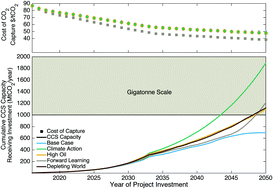CO2 enhanced oil recovery: a catalyst for gigatonne-scale carbon capture and storage deployment?†
Abstract
Using carbon dioxide for enhanced oil recovery (CO2-EOR) has been widely cited as a potential catalyst for gigatonne-scale carbon capture and storage (CCS) deployment. Carbon dioxide enhanced oil recovery could provide revenues for CO2 capture projects in the absence of strong carbon taxes, providing a means for technological learning and economies of scale to reduce the cost of CCS. We develop an open-source techno-economic Model of Iterative Investment in CCS with CO2-EOR (MIICE), using dynamic technology deployment modeling to assess the impact of CO2-EOR on the deployment of CCS. Synthetic sets of potential CCS with EOR projects are created with typical field characteristics and dynamic oil and CO2 production profiles. Investment decisions are made iteratively over a 35 year simulation period, and long-term changes to technology cost and revenues are tracked. Installed capacity at 2050 is used as an indicator, with 1 gigatonne per year of CO2 capture used as a benchmark for successful large-scale CCS deployment. Results show that current CO2 tax and oil price conditions do not incentivize gigatonne-scale investment in CCS. For current oil prices ($45 per bbl–$55 per bbl), the final CO2 tax must reach $70 per tCO2 for gigatonne-scale deployment. If oil price alone is expected to induce CCS deployment and learning, oil prices above $85 per bbl are required to promote the development of a gigatonne-scale CCS industry. Nonlinear feedbacks between early deployment and learning result in large changes in final state due to small changes in initial conditions. We investigate the future of CCS in five potential ‘states of the world’: an optimistic ‘Base Case’ with a low CO2 tax and low oil price, a ‘Climate Action’ world with high CO2 tax, a ‘High Oil’ world with high oil prices, a ‘Depleting Resources’ world with an increasing deficit in oil supply, and a ‘Forward Learning’ world where mechanisms are in place to drive down the cost of CCS at rates similar to other clean energy technologies. Through multidimensional sensitivity analysis we outline combinations of conditions that result in gigatonne-scale CCS. This study provides insight levels of taxes, learning rates, and oil prices required for successful scale-up of the CCS industry.



 Please wait while we load your content...
Please wait while we load your content...